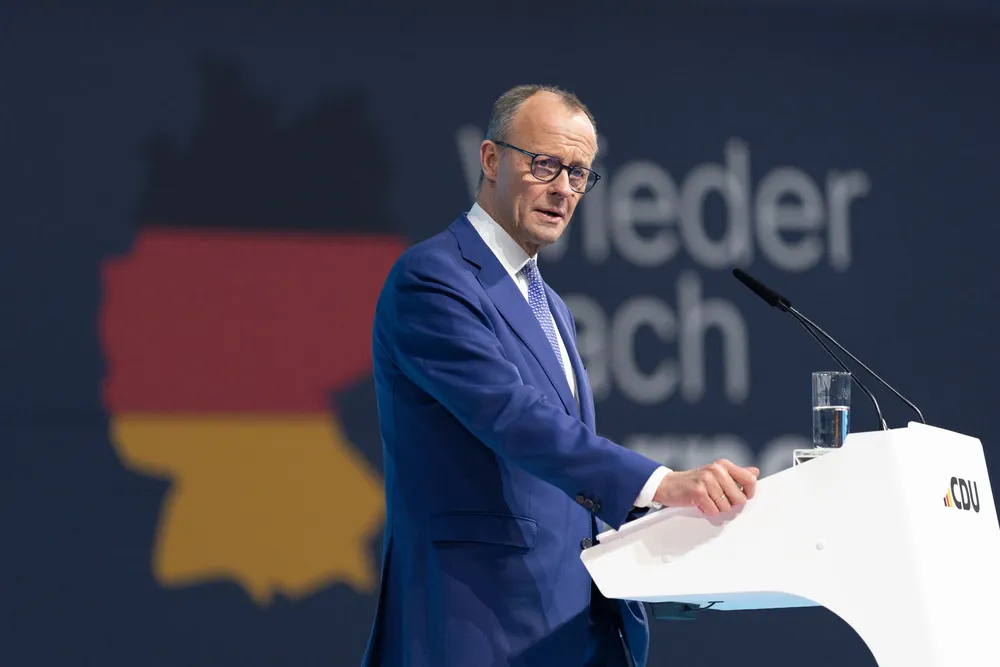German elections spell danger for Energiewende as Greens face tough maths
Favourite for Chancellorship Friedrich Merz is a wind sceptic – albeit a moderate one – while pro-renewables Greens are less likely to join government this time

Germany after its general election this Sunday is heading for complicated coalition building under current opposition leader Friedrich Merz of the conservative Christian Democratic Union (CDU), which is distinctively less pro-renewables than the outgoing government led by Social Democrat (SPD) Olaf Scholz.
Also, if the Greens are not part of the next administration – an increasingly likely scenario – the momentum for the Energiewende (energy transition) will slow down.
That leaves Merz with the option to form a coalition with Scholz’s SPD, which is seen at 14.5-17%, or possibly the Greens, which poll at 12-13%, depending on how high the Greens’ share will turn out to be in the end. In an additional complication, diverging views from Merz on immigration make a conservative-Green coalition less likely.
But much also depends on how three smaller parties fare.
After an upsurge in recent weeks due to successful social media campaigning, it now seems likely that the radical Left party will gain some 6-9% of the vote, while both the neo-liberal Free Democrats (FDP) and the conservative left Sahra Wagenknecht Alliance (BSW) could be struggling to surpass the 5% threshold needed to enter parliament.
However, if either the FDP or the BSW also get in, a two-way coalition may not have enough votes among members of parliament, and Merz would need a third partner to form a stable government.
On the other hand, the Greens' participation would certainly be good for wind power and renewables in general.
Under Green Party economics and climate minister Robert Habeck, Germany gave renewable energy projects priority status, eased permitting rules, and changed biodiversity protection to a population-based approach, instead of "looking at each and every bird" – all measures that diminished the scope for legal cases against wind projects.
The SPD in principle is also for continuing a rapid energy transition, but without the Greens may be more inclined to scale it down if it gains concessions in other areas. In 12 of former Chancellor Angela Merkel’s 16 years in power, the SPD had ruled with the conservatives, pursuing a slower energy transition and and dependence on Russian gas.
Merz officially claims to be ‘free of ideology’ in energy policy, but in practice, his CDU/CSU has lobbied for a reassessment of Germany’s nuclear exit and is unlikely to push for a continuation of Germany’s current rapid expansion of solar and wind.
If the FDP were to enter parliament, there is also a small chance for a three-way coalition between the CDU/CSU, the SPD and the FDP, as the conservatives would prefer the FDP over the Greens. The SPD, however, would not, as the FDP is generally seen as the driving force in the collapse of the Scholz government.
Energy costs crucial
All centrist parties have also said they want to bring down energy costs in Germany by lowering taxes on electricity, and the SPD and Greens want to cap grid fees.
Both could prove to be difficult due to the budgetary constraints that already led to the fall of the Scholz government.
To finance lower costs for energy, support industry in a struggling economy, while having to increase military spending in the light of the increasing Russian threat and support Ukraine after a possible withdrawal of US funds, Germany would most likely need to loosen the zero-deficit budgetary rule that is enshrined in the constitution.
But for a constitutional change, a two-thirds majority is needed in parliament, which seems increasingly difficult to achieve for the centrist parties, given the strengthening of the far-right AfD (and possibly also the BSW, FDP and Left in parliament), which together could form a blocking minority.
Whatever the outcome of Sunday’s elections, coalition building will be tough and the renewables industry may have to prepare itself for a next German government that is far less friendly to wind power and renewables than the outgoing one.
(Copyright)